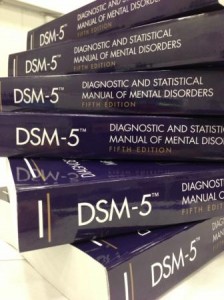
Until fairly recently, it was thought that autism spectrum disorder (ASD; previously known as PDD or pervasive developmental disorder) and attention deficit hyperactivity disorder (ADHD) were two entirely separate childhood-onset conditions and that they could not both be diagnosed in one individual.
Numerous studies in the last decade have shown that, in reality, a number of children appear to have symptoms of both, and in many situations fulfill the diagnostic criteria for both conditions. As such, the latest version of the Diagnostic and Statistical Manual, the DSM-5, which is a book used by psychiatrists to diagnose mental health problems across the lifespan, has allowed for a joint diagnosis to be made.

Image: American Psychiatric Association
Why this restriction was present in previous versions of the DSM is not entirely clear. Presumably, clinicians and researchers simply made the assumption that the social and communication difficulties and stereotyped behaviours of children with ASD could somehow account for any problems these children might show with hyperactivity, impulsivity or attention. The difficulty with this restriction was that ADHD symptoms in children with ASD were often overlooked and untreated.
Medications, particularly stimulants such as methylphenidate, are frequently and successfully used to treat ADHD. Because of the previous diagnostic restriction and lack of research addressing both conditions simultaneously, it is less clear whether these medications can be used to successfully treat ADHD symptoms in children with ASD. A recent systematic review and meta-analysis aimed to address this issue.
Methods
Two reviewers independently searched PubMed and ClinicalTrials.gov for relevant randomised control trials (RCT) that met the following inclusion criteria:
- The RCT was double-blind and had a placebo control group
- The trial lasted more than one week
- The outcome examined was ADHD symptoms
The results of RCTs using methylphenidate were meta-analysed, with the following outcomes examined:
- Global ADHD symptoms
- Hyperactivity, stereotyped behaviour and irritability, examined separately
- Adverse side effects (decreased appetite, depression, insomnia, irritability and social withdrawal)
Results

The number of studies and participants included in this review was very low, highlighting the need for caution in interpreting the findings and also the need for further research in this area
Only 7 studies met the inclusion criteria and were included in this review. Of these, 4 studies involving 94 children, examined the effects of methylphenidate and were meta-analysed and the other 3 studies examined the effects of atomoxetine (2 studies) or clonidine (1 study) and could not be meta-analysed.
- The meta-analysis showed that methylphenidate was more effective than the placebo at treating ADHD symptoms (z=2.2)
- Methylphenidate also showed a specific improvement of hyperactivity symptoms (z=3.6), though its effects on improving irritability (z=1.8) and stereotyped behaviours (z=1.6) were non-significant
- Children given methylphenidate experienced more of all the reported adverse effects (as listed above) than children given placebo
- The 2 RCTs of atomoxetine have conflicting results, with only the larger of the 2 studies suggesting improvements in ADHD symptoms relative to placebo. Both studies indicate increased rates of adverse side effects in the treatment groups
- The single clonidine study showed no positive treatment effect, though it only assessed 8 children
Conclusions
The results of this review need to be considered in the light of several important limitations:

More research is needed to decide if methylphenidate and atomoxetine improve ADHD symptoms in children with ASD
- The number of studies and participants included in this review was very low, highlighting the need for caution in interpreting the findings and also the need for further research in this area
- Because of the small number of studies, it is not possible to assess the literature for publication bias or assess the impact the quality of the included studies had on the results
- Although the RCTs included in this review reported hyperactivity symptoms as a specific outcome, in addition to global ADHD symptoms, they did not report on inattentive symptoms separately. So, it is unclear if methylphenidate improves inattention in children with ASD
- The majority of the children included in the RCTs were boys. Although this is unsurprising given that both ASD and ADHD are much more commonly diagnosed in boys than girls, it is important to assess the effects of medication in affected girls as well
This review suggests that there is preliminary evidence that methylphenidate and, to a lesser extent atomoxetine, may be effective at reducing ADHD symptoms in children with ASD. However, the authors note that the effect of methylphenidate in this study is lower than that seen in RCTs of methylphenidate in children with ADHD. Moreover, treatment with both methylphenidate and atomoxetine was associated with more adverse side effects, including sleep and eating difficulties, highlighting the need to consider other interventions in young children.
Related to this research, it is also important to consider whether the presence of ASD symptoms in children with ADHD has any effect on treatment, especially given that research suggests that ASD symptoms in these children index a more severe clinical presentation of ADHD and associated behavioural, emotional and cognitive difficulties.
Take-home messages
Preliminary results suggest that there may be some benefit of treating ADHD symptoms in children with ASD using the stimulant drug methylphenidate. However, more research is required to determine whether methylphenidate, atomoxetine and other drugs substantially improve ADHD symptoms in children with ASD and if these improvements are worth the risk of adverse side effects.
Links
Reichow, B., Volkmar, F. R., & Bloch, M. H. (2013). Systematic Review and Meta-analysis of Pharmacological Treatment of the Symptoms of Attention-Deficit/Hyperactivity Disorder in Children with Pervasive Developmental Disorders. Journal of autism and developmental disorders, 1-7.


Cutting across diagnostic categories: Does stimulant medication improve ADHD symptoms in children with autism … http://t.co/spPw0WSFwo
“@Mental_Elf: Do stimulants improve ADHD symptoms in children with autism? http://t.co/tiWkSacTQP” #CAMHS13
@trufflesquirrel on a review of drug treatment of ADHD symptoms in children with pervasive developmental disorders http://t.co/ZShQSxaFeB
Methylphenidate for ADHD symptoms in children with autism. Do the benefits outweigh the risks? http://t.co/ZShQSxaFeB
My latest blog post for the @Mental_Elf: review of drug treatment of #ADHD symptoms in children with #ASD http://t.co/81MEF2zxHv
@trufflesquirrel @mental_elf Nice work :)
Does stimulant medication improve ADHD symptoms in children with autism spectrum disorder? http://t.co/DLsnWgNRc3 via @sharethis
More research is needed to decide if methylphenidate & atomoxetine improve ADHD symptoms in children with autism http://t.co/ZShQSxaFeB
In case you missed it earlier: Do stimulants improve ADHD symptoms in children with autism? http://t.co/ZShQSxaFeB
Mental Elf: Cutting across diagnostic categories: Does stimulant medication improve ADHD symptoms in children… http://t.co/1bu6viZSU2